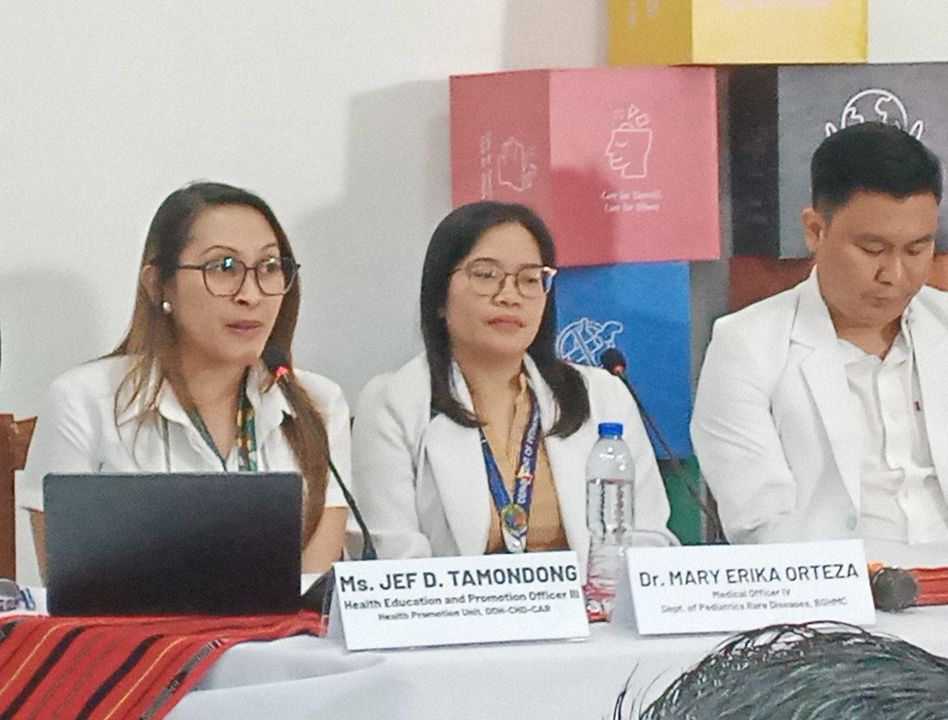BAGUIO CITY – In celebration of Health Promotion Week, the Department of Health – Cordillera Administrative Region (DOH-CAR) on Tuesday, October 8, unveiled seven healthy habits aimed at helping individuals achieve optimal health and improved quality of life.
Dr. Jef Tamondong, DOH-CAR Health Education and Promotion Officer II, emphasized that the seven key habits are aligned with the priority areas of the health promotion strategy: diet, environment, immunization, substance use, mental health, sexual health, and violence and injury prevention.
For diet, the Pinggang Pinoy is highlighted as it provides a visual guide for the proper distribution of food per meal, emphasizing variety and moderation, with adjustments across age groups.
Tamondong also stressed the importance of checking the nutrition facts of purchased food. Alongside a proper diet, 30 minutes of daily physical activity is also recommended.
In terms of environmental health, the practice of handwashing with soap for 20 seconds, or two rounds of the “Happy Birthday” song, remains ideal.
According to the World Health Organization (WHO), proper handwashing is especially critical in five situations: before cooking, before eating, after using the bathroom, after changing diapers, and after disposing of trash.
Proper waste segregation and disposal also contribute to a healthy environment. During emergencies, a “Go Bag” should always be prepared. This should contain essentials to sustain a person for 72 hours, including non-perishable food, water, a first aid kit, personal hygiene items, necessary medications, important documents, clothing, a flashlight, and a power bank.
Immunization is another key focus, with vaccines recommended across various age groups. For infants, five essential vaccines must be administered before one year of age: Bacillus Calmette–Guérin (BCG) for tuberculosis, Hepatitis B, Pentavalent vaccine (which protects against diphtheria, tetanus, pertussis, hepatitis B, and Haemophilus influenzae type b), Oral Polio Vaccine (OPV), and the Measles, Mumps, and Rubella (MMR) vaccine.
These vaccines are crucial in preventing life-threatening diseases and supporting long-term health.
For older adults, flu vaccination is recommended, while human papillomavirus (HPV) vaccination is encouraged for females aged 9 to 14 to help prevent cervical cancer.
The use of tobacco, vaping, alcohol, and recreational substances is discouraged. Instead, participation in sports, youth activities, and community programs is encouraged as positive alternatives.
Mental health is also a priority, with individuals encouraged to engage in self-care, pursue activities that bring joy, and maintain meaningful connections with family, friends, and peers.
Reproductive health awareness is supported, including the practice of safe sex to prevent sexually transmitted infections (STIs) and the effects of the Human Immunodeficiency Virus (HIV).
Family planning and the use of modern contraceptive methods are also encouraged to help manage family health and financial stability.
As major holiday celebrations approach, motorists and travelers are reminded to drive safely, while pedestrians should remain alert and cautious when crossing roads. Parents and guardians are also urged to supervise children near large bodies of water.
The agency further advocates for safer ways to celebrate Christmas and welcome the New Year—promoting alternatives to fireworks that offer light and sound without the associated hazards.
Tamondong reminds people that through obtaining proper health education, proper attitude towards health is formed until it is honed into practice and imbibed into a series of healthy behaviors.
Health Promotion Week is celebrated every second week of October alongside other health promotion campaigns and advocacy events. By Aiyra Marzan


